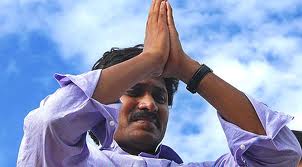
Hyderabad, May 9: In a move that is expected to cripple YSR Congress chief Jaganmohan Reddy, the Central Bureau of Investigation (CBI) has written to the State Bank of India in Hyderabd, directing it to freeze the accounts of three large parts of his considerable empire - Jagathi Publications, Indira TV and Janani Infrastructure - pending an inquiry by it. (Read: CBI's letter to the State Bank of India)
The CBI has, in its letter, said that that it is carrying out a probe on the orders of the Andhra Pradesh High Court in August last year, directing it to register a case against and thoroughly inquire into alleged financial misdeeds of Jagan. It believes that Mr Reddy, one of India's richest politicians with declared assets worth 365 crores, benefited from his father's position as chief minister. YS Rajasekhara Reddy, who died while in office in 2009, allegedly asked companies to invest in Jagan's firms and in return, they were granted licenses or other clearances.
The investigating agency has said those funds were parked in the bank accounts in the guise of conducting business. Hence, under section 102 of the Criminal Procedure Code, 1973, it wants those accounts to be frozen and a prohibition of operations in all the three accounts.
The move comes barely 24 hours after summons were issued to Jagan and 12 others to appear before a Special CBI Court on May 28. The court has also asked 12 others facing charges in the case to appear before it on the same day.
Jagan's supporters allege that the move is politically motivated. They say that the leader's political opponents are unable to take on and deal with his growing political popularity and that this is a desperate attempt to try and stop him. They intend to challenge the order in court.
The move to freeze accounts happened even as Jagan was campaigning in Anantpur district, ahead of by-elections next month.
Meanwhile, Jagathi Publications that runs Sakshi newspaper and Indira Television that runs Sakshi TV have called this an attempt to stifle the media and an attack on the freedom of the press. They will complain to the Press Council of India. The employees of the three companies are worried about what will happen to them.
Political analyst K Nageswar says that while the CBI is acting within the law in freezing the accounts, notices should have been issued prior to the action and economic flexibility should have been allowed pending the probe, since there are only allegations as yet to be tried in a court of law.
The special CBI court had admitted the first chargesheet filed on March 31 by the CBI in the disproportionate assets case and listed the case for trial.
Accordingly, summons were issued to Jagan, the prime accused in the case, and the other accused.
The summons were issued on a day when the CBI, probing the case against Jagan and the others, submitted its third chargesheet in the court. The 88-page chargesheet was filed after examining 72 witnesses.
The CBI also booked 73 companies and individuals, alongwith Jagan, on the directions of the High Court. Others named in the chargesheet include Jagan's close aide Vijay Sai Reddy, Jagati Publications Private Limited (JPPL), Ayodhya Rami Reddy, IAS officer Venkatrami Reddy, and Ramkey Pharma.
The third chargesheet contains details of undue favours granted to a company called Ramky Pharma during YSR's regime. Ramky Infra has been accused of depositing a huge sum of money in the accounts of Jagati Publications owned by Jagan Reddy.
Vijay Sai Reddy was arrested by the CBI on January 2. The Vice-President of JPPL is also an auditor for many other companies of Jagan.





Comments
Add new comment